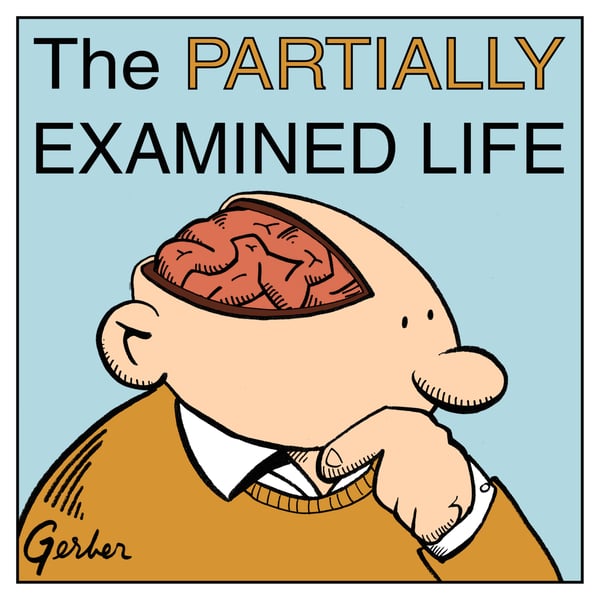Ep. 329: Kierkegaard on Irony (Part Three/Closereads Part One)
The Partially Examined Life Philosophy Podcast
Mark Linsenmayer
4.6 • 2.3K Ratings
🗓️ 25 November 2023
⏱️ 53 minutes
🧾️ Download transcript
Summary
Mark and Wes Closeread the conclusion to Soren Kierkegaard's On the Concept of Irony (1841), "Irony as a Controlled Element, the Truth of Irony." The discussion starts with the role of irony in good art, and then moves on to discuss the proper role of irony as an existential strategy in a well-grounded, thoughtful life.
To get all Part Three PEL episodes, plus paywalled vintage episodes, Nightcaps, and all PEL episodes ad-free, become a PEL supporter at partiallyexaminedlife.com/support.
Signing up to support Closereads: Philosophy with Mark and Wes at patreon.com/closereadsphilosophy will get you access to 20+ recordings like this, including (soon) the direct sequel to this one.
Transcript
Click on a timestamp to play from that location
| 0:00.0 | It's the partial exam in life episode 329 part 3. We're going to do a close reads here. We're doing |
| 0:14.0 | kirka guards the concept of irony from 1841 the conclusion. |
| 0:18.4 | Conclusion which is called irony as a controlled element of the truth of |
| 0:22.2 | irony. It is page 324 in the text. |
| 0:26.0 | Start us off, Wes. |
| 0:28.0 | It has already been pointed out in the foregoing that in his lectures on aesthetics, |
| 0:33.0 | Solger makes irony to condition for every artistic work. |
| 0:36.0 | When we now in this context say that the poet must be related ironically to his writing, |
| 0:41.0 | this means something different from what was said about this earlier. |
| 0:45.7 | Shakespeare has frequently been eulogized as the Grand Master of Irony, |
| 0:50.0 | and there can be no doubt that there is justification for that. |
| 0:53.0 | But by no means does Shakespeare allow the substantive worth to evaporate into an ever more fugitive supplement. |
| 1:00.0 | And as for the occasional culmination of his lyrics in madness, there is an extraordinary degree of objectivity in this madness. |
| 1:09.0 | When Shakespeare is related ironically to what he writes, it is precisely in order to let the objective dominate. |
| 1:16.0 | Irony is now everywhere present. |
| 1:19.0 | It sanctions every single line so that there will be neither too much nor too little. |
| 1:25.3 | In order that everything can have its due, in order that the true balance may be achieved |
| 1:30.4 | in the Yeah, we're being dropped in and we don't care about who soldier is. He's a he's another playwright. I mean it's it's what is being quoted that's important. |
| 1:48.0 | Ironies necessary for every kind of art. I just want to say this is like the clearest thing I've ever read by |
| 1:54.7 | Kircherd and also the most enjoyable. I think he's right in a way, well to the extent that I understand him so Shakespeare is |
| 2:06.4 | eulogized as the grand master of irony but what is his the extraordinary degree of |
| 2:11.7 | objectivity that that's what makes the irony good as |
... |
Please login to see the full transcript.
Disclaimer: The podcast and artwork embedded on this page are from Mark Linsenmayer, and are the property of its owner and not affiliated with or endorsed by Tapesearch.
Generated transcripts are the property of Mark Linsenmayer and are distributed freely under the Fair Use doctrine. Transcripts generated by Tapesearch are not guaranteed to be accurate.
Copyright © Tapesearch 2025.

